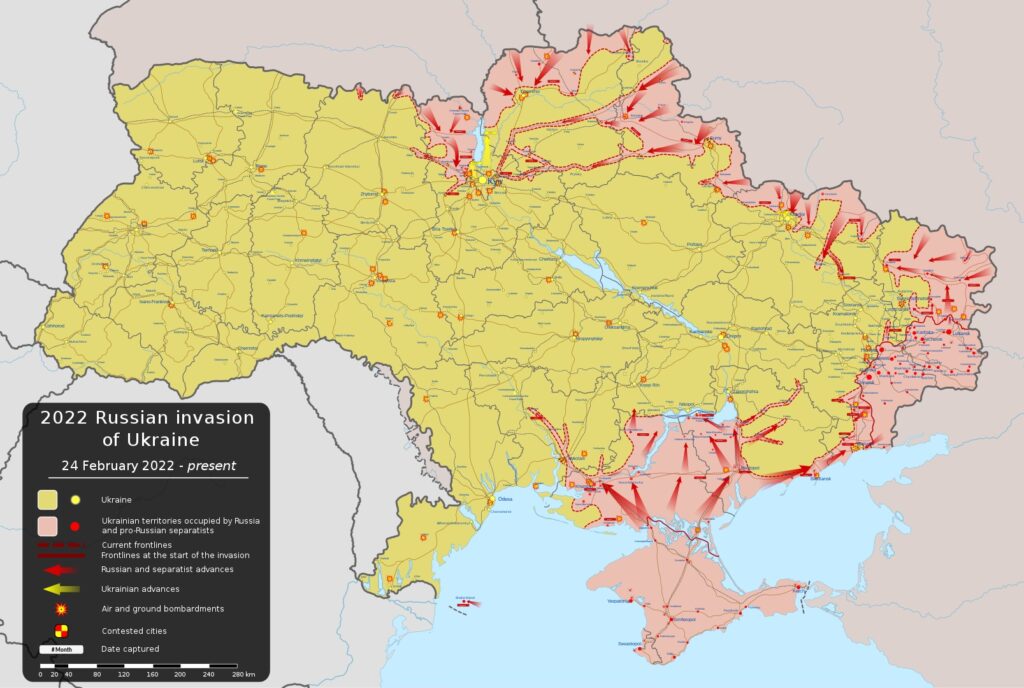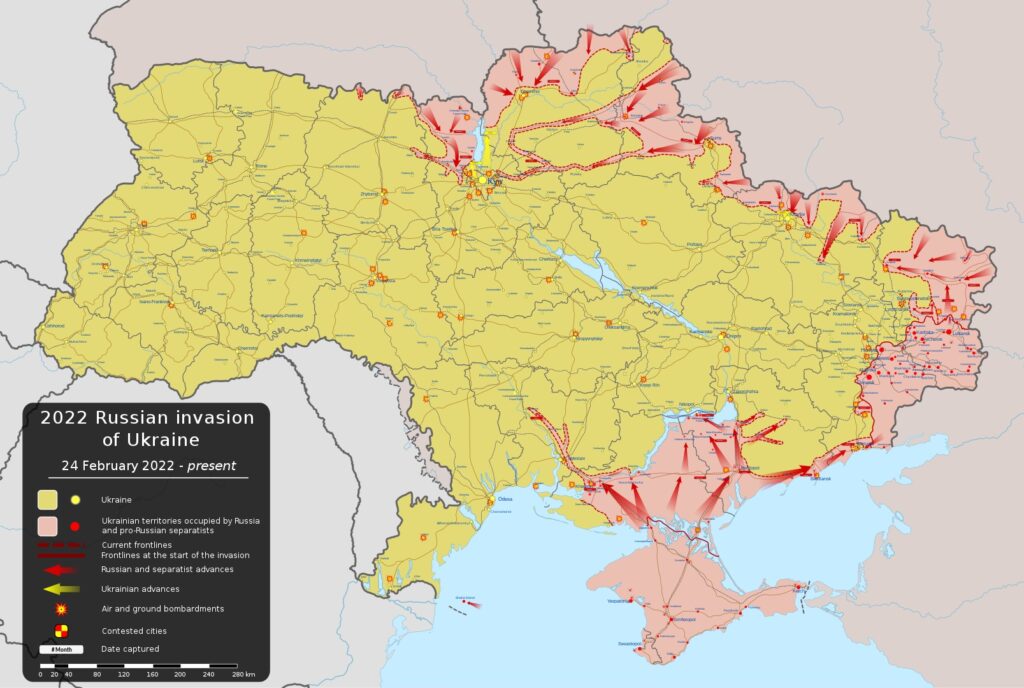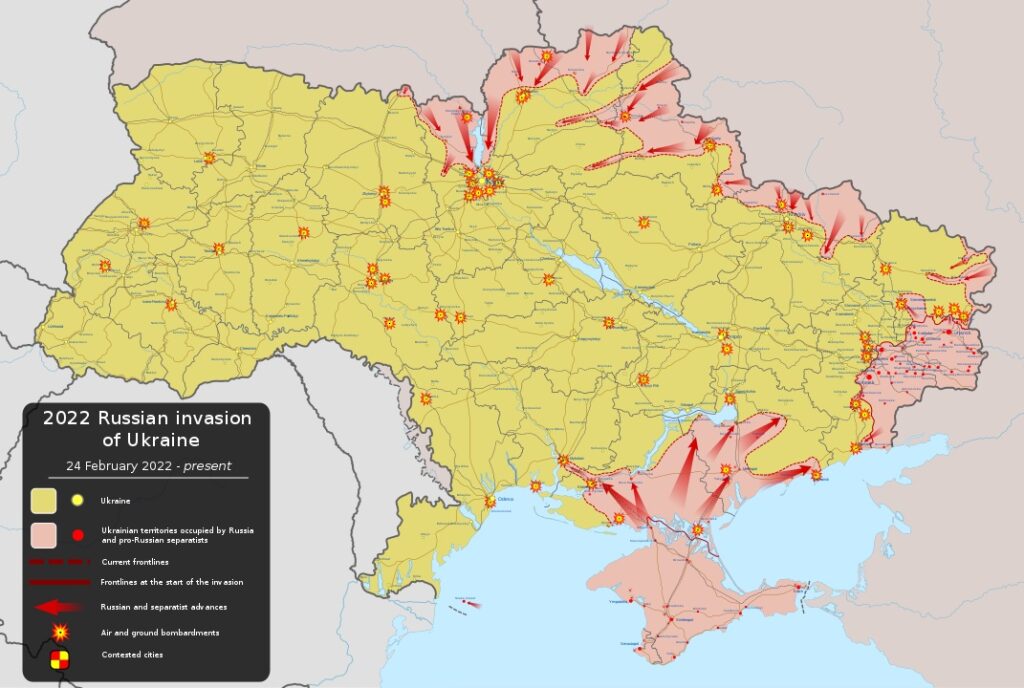
Much as I predicted last week, the war in Ukraine has ground into a stalemate. Russia has made no significant advances in the last few days, and actually not much in the last couple of weeks. Meanwhile negotiations between the two sides continue. I got rather excited yesterday when the Financial Times published a newsflash suggesting that Russia and Ukraine had agreed a 15-point plan. This sounded promising, but there has been no wider confirmation. The statements coming from Moscow continue to be bleak. Where are we at?
The reporting from the BBC continues to focus on human drama at the expense of any clear perspective on what is happening. This is especially true of Lyse Doucet, reporting from Kyiv. In her reports Russia is “extending its attack” and getting ever closer to the centre of the city. The sound of Russian artillery is louder she says – though I’m not clear how she is distinguishing between the Russian and Ukrainian guns. In fact military experts suggest that the Russians aren’t getting any closer (though they are doubtless consolidating the gains they have already made, and bringing in more forces, perhaps including artillery). Much is made of missile strikes, which are hitting high-rise residential blocks. These weapons are being fired from a distance and appear to be unguided. Precision weapons are expensive and Russia has doubtless run down its stock. This does not look like a decisive strategy. There seems to be a random element in Russian targeting, arising from the use of these long-range and unguided munitions; they are clearly not bothered about hitting civilian structures, but neither is likely that specific structures are being aimed at. This is doubtless true of Mariupol too – Russian hits on a maternity hospital, and then a theatre being used as a shelter, are unlikely to have been singled out for attack, as suggested by the Ukrainian government, and repeated by BBC reporters. But neither are Russians making any effort to avoid them.
The Russian attack has clearly run out of steam. They are desperately trying to find extra troops to feed in, including recruiting Syrian mercenaries. The numbers and types of forces don’t sound decisive, though. This would be an excellent moment for the Ukrainians to launch a serious counteroffensive. But their counterattacks seem to be quite limited. That suggests that they too lack the types of forces to mount decisive attacks – this would be beyond the extensive territorial defence forces that the country has built up so rapidly. Perhaps they are still trying to assemble and train forces able to conduct such operations, or waiting to reinforce their air force. They may be worrying about Russia’s remaining air capability, and its ability to counter any Ukrainian ground operations. This could be one reason for the country’s desperate appeals for Nato to enforce a no-fly zone.
Meanwhile the Russian government seems to be consolidating its hold on domestic politics. They have closed down independent news sources, and provided a steady stream of nonsense to bolster their side of the story. Vladimir Putin seems to be turning on the Russian middle classes, who are attracted to western values, and may have access to to external news sources. He is increasingly branding middle class sceptics as an un-Russian fifth column. This strategy also creates a narrative for resistance to Western sanctions – who wants to support a decadent Western lifestyle? People are naturally patriotic, and Mr Putin’s strategy may well be working. There seems to be little substantive dissent. The Russian public may not have been ready for the war when it started, but as it drags on, they may be as accepting of its consequences as are Ukrainians, with their remarkable rallying to their country.
Russian resilience is to be expected. They do have some weak links, however. They will not easily be able to replace hi-tech imports from the West. This may even affect their advanced weaponry. On the international scene, their Belarusian ally is weaker than Russia. They have not contributed troops directly to the campaign, even though Russia has requested them, apparently. If that country breaks out into serious dissent and unrest, Russia has no spare troops to help President Lukashenko out. These seem long shots though.
But if Russia looks quite secure, that still leaves the question of how it is supposed to win this war. The aim of establishing an occupying army or a puppet regime now look hopeless. So it makes sense to explore what the Ukrainians are willing to concede, so that they can declare victory and pull out. And the Ukrainian government must also be asking how this war is supposed to end. They don’t seem to have sufficient forces to launch a major counteroffensive to send at least one of the four major Russian thrusts back to where they started. So they too have an interest in exploring the options for a settlement.
The starting point is clearly for a ceasefire, and for Russian forces to retreat back to their start lines. That would mean Russia continuing to occupy Crimea and the eastern Donbas. Which leads us to the question of territory. It is conceivable that Ukraine concedes the Russian takeover of Crimea. The Donbas is trickier – Russia, on behalf of its surrogates, claims additional territory there. Some kind of international resolution of these might be a way forward, based on consulting the people that live in these regions. That will be hard amid the rubble of war. A previous attempt at this, the Minsk accords, has failed – there does not seem to have been any enthusiasm for this route forward from either side.
As for political control, Russia will have to drop its stated aim of “de-nazification” – replacing the current Ukrainian government with one that is more amenable. However the Russians demand for the country’s neutrality looks more feasible. Ukraine’s president Volodymyr Zelensky seems to have conceded staying out of Nato, on the basis that membership was never actually on the cards anyway. Finland, Sweden and Austria have adopted formal neutrality after all. The Russians have also said that Ukraine should not join the EU either. That will be much harder for the Ukrainians to concede. And the EU will be much more willing to accept it as a member than it was before the war – though there are obstacles.
There is also the question of “demilitarisation”, another Russian war aim. That will also be quite hard for the Ukrainians to concede, but it will be necessary for them to show that Ukraine lacks a major offensive capability. Renouncing longer-range weapons could be one part of this.
And what of the wider international community? If the war ends, the sanctions regime against Russia and Belarus needs to be reviewed. But the more that Russia gets, the harder this will be. Clearly there needs to be some kind of negotiation between Nato countries and Russia about deployments of forces in Europe – but Russia’s bargaining position is weak. Nato will insist that the Baltic countries are allowed to strengthen their defences.
We can only hope that something is sorted out and that the war is ended soon. The ongoing negotiations at least offer us a degree of hope.


